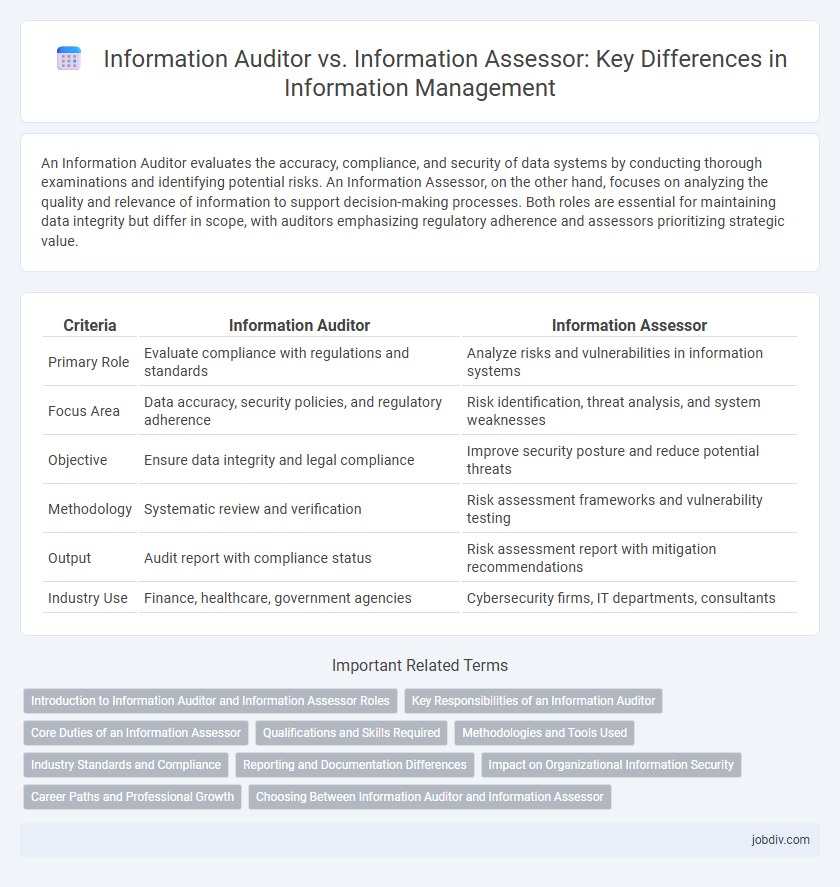An Information Auditor evaluates the accuracy, compliance, and security of data systems by conducting thorough examinations and identifying potential risks. An Information Assessor, on the other hand, focuses on analyzing the quality and relevance of information to support decision-making processes. Both roles are essential for maintaining data integrity but differ in scope, with auditors emphasizing regulatory adherence and assessors prioritizing strategic value.
Table of Comparison
| Criteria | Information Auditor | Information Assessor |
|---|---|---|
| Primary Role | Evaluate compliance with regulations and standards | Analyze risks and vulnerabilities in information systems |
| Focus Area | Data accuracy, security policies, and regulatory adherence | Risk identification, threat analysis, and system weaknesses |
| Objective | Ensure data integrity and legal compliance | Improve security posture and reduce potential threats |
| Methodology | Systematic review and verification | Risk assessment frameworks and vulnerability testing |
| Output | Audit report with compliance status | Risk assessment report with mitigation recommendations |
| Industry Use | Finance, healthcare, government agencies | Cybersecurity firms, IT departments, consultants |
Introduction to Information Auditor and Information Assessor Roles
Information Auditors evaluate data management systems to ensure compliance with regulatory standards and internal policies, focusing on identifying risks and verifying accuracy and security of information. Information Assessors analyze the quality, relevance, and reliability of data to support decision-making and policy development, emphasizing data validation and integrity assessment. Both roles are critical in maintaining robust information governance frameworks within organizations.
Key Responsibilities of an Information Auditor
An Information Auditor conducts comprehensive examinations of data management systems to ensure compliance with regulatory standards and organizational policies. They evaluate the accuracy, security, and integrity of information assets by performing audits, risk assessments, and controls testing. Key responsibilities include identifying data vulnerabilities, recommending corrective actions, and preparing detailed audit reports to support information governance and operational efficiency.
Core Duties of an Information Assessor
Information Assessors primarily evaluate data integrity, system security, and compliance with regulatory standards to ensure accurate and reliable information management. They conduct thorough risk analyses, data validation processes, and vulnerability assessments, focusing on identifying potential threats to information assets. Their core duties emphasize proactive identification of information weaknesses and the implementation of corrective measures to enhance data governance frameworks.
Qualifications and Skills Required
Information auditors require strong expertise in information security standards such as ISO 27001, risk management, and compliance frameworks, along with analytical skills and attention to detail to evaluate data integrity and protection measures. In contrast, information assessors focus on data accuracy, relevance, and quality, needing proficiency in data analysis, validation techniques, and sector-specific knowledge to ensure information reliability. Both roles demand excellent critical thinking, communication abilities, and a solid understanding of information systems.
Methodologies and Tools Used
Information auditors use comprehensive frameworks such as ISO 27001 and COBIT to systematically evaluate information security and compliance, employing tools like risk assessment software and audit management systems. Information assessors focus on qualitative and quantitative analysis methodologies, leveraging data analytics platforms and vulnerability scanners to measure data integrity and system performance. Both roles utilize specialized tools to identify risks and ensure effective information governance, but auditors emphasize compliance verification while assessors prioritize evaluative insights.
Industry Standards and Compliance
Information Auditors evaluate organizational data management and security controls against industry standards such as ISO 27001 and GDPR compliance frameworks, ensuring adherence to legal and regulatory requirements. Information Assessors focus on identifying information risks and vulnerabilities through systematic analysis aligned with standards like NIST SP 800-53, facilitating risk mitigation and governance improvements. Both roles are critical in maintaining robust information security postures and achieving continuous compliance within enterprises.
Reporting and Documentation Differences
Information Auditors produce comprehensive reports that systematically evaluate compliance with established standards, emphasizing detailed documentation of findings, control effectiveness, and risk exposure. Information Assessors generate concise assessment summaries that highlight identified vulnerabilities and recommendations without the exhaustive formal reporting typical of audits. Reporting by auditors typically serves regulatory or certification purposes, while assessors focus on providing actionable insights to improve information security posture.
Impact on Organizational Information Security
Information Auditors systematically evaluate an organization's information security controls and compliance with regulatory standards, identifying vulnerabilities and gaps that could lead to data breaches. Information Assessors focus on analyzing risks associated with information assets to prioritize security measures and enhance overall risk management strategies. Both roles significantly impact organizational information security by ensuring robust protection mechanisms are in place and aligned with business objectives.
Career Paths and Professional Growth
Information auditors specialize in evaluating the accuracy, security, and compliance of data systems, often leading to roles in risk management, cybersecurity, and regulatory compliance. Information assessors focus on analyzing data quality and integrity to support decision-making, which can evolve into careers in data governance, analytics, and strategic planning. Both career paths offer professional growth through certifications such as CISA for auditors and CBIP for assessors, enhancing expertise and value in information management industries.
Choosing Between Information Auditor and Information Assessor
Choosing between an Information Auditor and an Information Assessor depends on the specific needs of your organization's information governance. An Information Auditor systematically evaluates the accuracy, compliance, and security of data systems to identify risks, while an Information Assessor focuses on analyzing information quality and relevance to improve decision-making processes. Prioritizing compliance and risk management favors an Information Auditor, whereas enhancing data effectiveness and utility aligns better with hiring an Information Assessor.
Information Auditor vs Information Assessor Infographic

 jobdiv.com
jobdiv.com